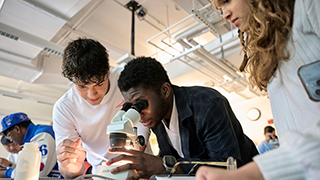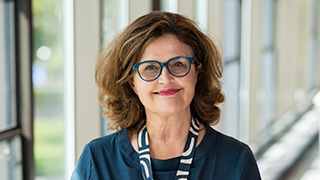Seton Hall Introduces New M.S. in Molecular Bioscience, Accelerated 3+2 STEM Dual-Degrees
Wednesday, January 15, 2025
 Seton Hall University is pleased to announce the launch of its new Master of Science (M.S.) in Molecular Bioscience, along with three STEM dual-degree (3+2) programs: the B.S. Biology/M.S. Molecular Bioscience, the B.S. Chemistry/M.S. Chemistry and B.S. Physics/M.S. Applied Physics and Engineering.
Seton Hall University is pleased to announce the launch of its new Master of Science (M.S.) in Molecular Bioscience, along with three STEM dual-degree (3+2) programs: the B.S. Biology/M.S. Molecular Bioscience, the B.S. Chemistry/M.S. Chemistry and B.S. Physics/M.S. Applied Physics and Engineering.
The new M.S. program blends the former M.S. in Biology and M.S. in Microbiology programs
into a single, unified curriculum, providing students with greater flexibility to
tailor their advanced postgraduate education to their career goals.
Under the new program, students will continue to customize their studies, choosing
from two program experiences – laboratory based (with a research thesis) or theoretical
analysis oriented (with a library thesis). In whichever path, students start with
foundational coursework in biostatistics and biology before moving on to more specialized
electives and thesis-related coursework.
With additional options to concentrate in neuroscience or microbiology, the program
offers well-rounded preparation, academic growth and professional development that
provide students with the skills and confidence to move into advanced roles within
the biotechnology, pharmaceutical, clinical, healthcare and other related sectors.
"The integrated M.S. in Molecular Bioscience capitalizes on our deep faculty expertise
in cellular biology, virology, genetics and genetic data science, and bioinformatics
and our excellent facilities. It brings together what we do best – challenging the
next generation of scientists to think critically while preparing them to lead, innovate
and thrive in a rapidly changing scientific landscape – and builds on Seton Hall’s
long-standing commitment to excellence in STEM education,” said Jonathan Farina, Ph.D.,
interim dean of the College of Arts and Sciences.
According to the U.S. Bureau of Labor Statistics, employment in STEM occupations will grow by 10.8 percent by 2030, more than quadrupling
the growth rate for non-STEM occupations (2.3 percent), indicating an ongoing demand
for skilled professionals in STEM fields.
“Through a curriculum that is both comprehensive and specialized, graduates will gain
a deeper understanding of molecular biology and targeted training in areas vital to
the biotechnology and healthcare sectors,” added Tinchun Tina Chu, Ph.D., program
director and professor in the Department of Biological Sciences.
Graduate-level education can help students not only take on higher-level roles with
increased salaries, but also make significant contributions to scientific advancements
due to their specialized training and in-depth knowledge.
Introducing Accelerated Dual-Degree STEM Pathways
In addition to the M.S. in Molecular Bioscience, three 3+2 dual-degree programs will
enable Seton Hall students to earn both B.S. and M.S. degrees in just five years:
the B.S. Biology/M.S. Molecular Bioscience, the B.S. Chemistry/M.S. Chemistry and the B.S. Physics/M.S. Applied Physics and Engineering.
These dual-degree programs combine undergraduate and graduate-level studies in their
respective fields, meaning students can engage in advanced research and further refine
their academic and professional skillsets before they enter the job market.
Through extra, graduate-level classroom time and coursework, students can spend more
time honing their skills and working alongside faculty – which, in turn, can open
the doors for added career development opportunities like presenting at conferences
or publishing their work in industry journals.
Dual-degree pathways also allow students to earn both degrees in less time and at
a lower cost compared to the traditional manner of pursuing them separately.
“Our new dual-degree programs open accelerated pathways, enabling incoming and current
students to move quickly and confidently through their studies with the kind of depth
that prepares them not just for their first job, but for long-term success in the
modern STEM workforce,” commented Farina.
“It’s an opportunity for students to combine the best of undergraduate and graduate
education in an efficient and more affordable way that maximizes both academic and
professional potential – all while helping them stand out in a competitive job market.”
Both students within the M.S. in Molecular Bioscience and dual-degree programs will
benefit from the University’s Science and Technology Center, home to the University’s
various state-of-the-art research laboratories, classrooms and faculty offices within
the natural sciences.
With access to advanced research facilities and close proximity to New Jersey's renowned
pharmaceutical and technology sectors, students can take advantage of distinct opportunities
for interdisciplinary collaboration, networking and career advancement in their chosen
fields.
About the College of Arts and Sciences
Featuring innovative technology and varied opportunities for experiential learning
and collaborative research – all with a liberal arts foundation that fosters critical
and creative thinking – the College of Arts and Sciences is Seton Hall's largest and oldest college, with an eclectic array of programs for
undergraduate and graduate students alike. Students who graduate from the College
are poised for both personal fulfillment and success in the workplace, using their
professional and critical thinking skills to make a difference in their communities.
Categories: Education, Science and Technology






